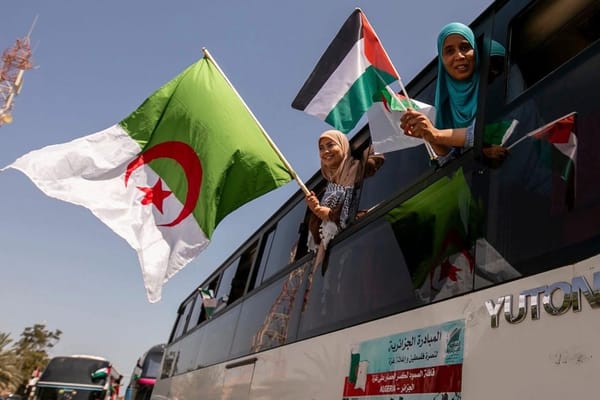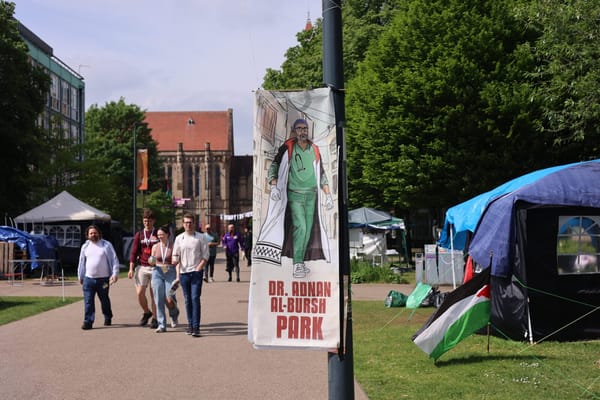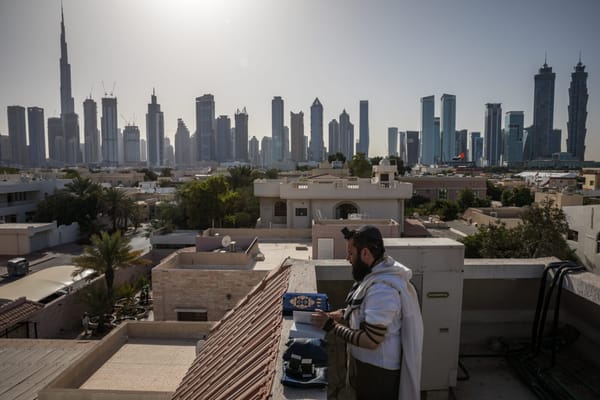Fragile Glasnost on the Tigris
Sitting in Baghdad’s packed Café Shahbandar on a Friday afternoon in June of 2003, I was overwhelmed by the atmosphere of open discussion and genuine freedom.

Sitting in Baghdad’s packed Café Shahbandar on a Friday afternoon in June of 2003, I was overwhelmed by the atmosphere of open discussion and genuine freedom.
Drawn by the open-air used book market on nearby al-Mutanabbi Street, the patrons -- old journalists, professors and hip artists with shoulder-length hair -- did not seem bothered by the lack of electricity to drive the overhead fans on this 120-degree day, or even the lack of space on the café benches. Smoking a water pipe and drinking sweetened lemon tea, I watched communists hand out their free newspaper, a returned exile distribute handbills calling for a new association of artists and poets, and a young sculptor pass around business cards prominently displaying his new e-mail address. When new arrivals entered, their arms full of books, they were greeted with loud cheers and sometimes tears in the eyes of those already there. Amidst the exuberant talking, arguing and planning in the café, the feelings of community and joy were infectious. The excitement was made more intense by the fact that the conversations, the newspapers and even the act of gathering like this would have been unthinkable under Saddam Hussein’s regime.
The moment stood in stark contrast to my previous visit to Café Shahbandar shortly before the war. On a much cooler January afternoon, I sat in the nearly empty café speaking in hushed tones about politically innocuous subjects with a colleague from the university, while old men silently, aimlessly watched state-run television, taking long draws on their pipes. My thuggish minder from the secret police remained just within earshot, near the entrance.
The removal of Saddam and his government has eliminated for the time being the ideological checks and networks of surveillance which prevented free expression. Internal thought policing and the language of self-censorship -- the most pernicious forms of oppression -- are ebbing, as Iraqis of all strata test for themselves the very limits of free speech and thought.
Boys hawking Baghdad’s scores of new newspapers fill the streets. Cybercafés have sprouted near the universities and in the more middle-class districts of the city. Multilingual political graffiti cover the walls of state buildings and deface the kitschy public art which clutters parks and traffic circles. Groups of citizens have renamed squares and entire neighborhoods after beloved figures from the past, like ‘Abd al-Karim Qasim, who briefly ruled Iraq after the fall of the Hashemite monarchy and is now remembered by many as a benign dictator, or the murdered Shi‘i cleric Ayatollah Muhammad Sadiq al-Sadr, father of Muqtada al-Sadr, the populist leader and vocal opponent of the occupation. With this grand and anarchic project of iconoclasm, Baghdadis are laying claim to their city and its civil society. In so doing, they are inscribing on its face indelible layers of meaning and new memories.
To even the most jaded observer, these are revolutionary times in the Iraqi capital; however, it would be wrong to draw analogies to Berlin after the Wall came down or Prague in the early 1990s. Unlike the citizens of those cities, Baghdadis live under foreign occupation and lack the rudimentary structures of public safety and urban life itself. While Iraq is freer than it has been in recent memory, that sense of freedom is tempered by palpable trepidation about the future. Beneath the enthusiasm and intellectual exploration is a deep fear and a hesitant expectancy that makes thinking about the future not just difficult, but a luxury few can afford.
Baghdad’s several universities are exemplary of that dilemma. As a consequence of post-war looting and arson, truly abysmal conditions prevail on the campuses -- classrooms lack tables and chairs, examination booklets and even chalk. Still, in June the normal rhythm of the academic year had begun to return. Excited and happy to be at school, young men and women have set up makeshift cafeterias where they gather to debate and enjoy one another’s company. The students are all well-dressed -- a major accomplishment in the heat and without running water. Their professors even complain about them as an American professor might complain about students.
While the resourcefulness of Iraqi faculty and students is readily in evidence, they were struggling with the corrosive impact of the US-imposed process of de-Baathification, a rising Islamism and partisan fragmentation. Campuses are becoming overtly politicized in ways that may lead to the suppression of open exchange and freedom of thought. Increasingly frequent incidents of harassment of non-veiled coeds and teachers, student-on-student violence and assassinations of education administrators are equally matters for concern. The possibility that cycles of violence could infest the universities was brought home by the brutal murder on July 27 of the former president of Baghdad University, Muhammad al-Rawi, who was a leading Baathist.
The situation on the campuses highlights the fragility of the glasnost on the Tigris. It could vanish in the face of increased insecurity, a renewed climate of surveillance, media controls or the failure to adequately fund higher education. The new openness is also threatened by the persistence of pre-war ideologies, the underlying policy agenda of the US occupation and the lack of competence and colonial ethos of its administering bureaucracy, known officially as the Coalition Provisional Authority (CPA).
Examples of that return to the ideologies of the time before the war are in full view at one of the two leading multidisciplinary research institutes in the city, the Bayt al-Hikma, literally, “House of Wisdom.” Bayt al-Hikma takes its name from an institute founded in 832 by the Abbasid Caliph al-Ma’mun that was famous for its translations of Greek philosophical texts into Arabic. The modern Bayt al-Hikma was established in 1995 by Saddam’s Presidential Office. As originally conceived, this Bayt al-Hikma functioned as a research center, with lecture facilities, publications, a library and a museum.
Before the fall of the regime, the Bayt al-Hikma acquired the reputation of being intimately tied to the inner circles of power. Doctoral dissertations and other scholarly works attributed to members of Saddam’s family were ghost-written by faculty affiliates. More generally, the Bayt al-Hikma served as a center for the production of regime-sanctioned knowledge and political orthodoxy and was emblematic of the 1990s shift in dominant Iraqi nationalism from broader secular pan-Arabism to an ill-defined localism. At the same time, linked as it is with the caliphal past, the Bayt al-Hikma recalls a moment when Baghdad was the center of the Islamic world. The regime’s investment in Islamic institutions, the building of mega-mosques and the more ironic burial of one of the three founders of the Baath, Michel ‘Aflaq, in a mosque-mausoleum complex are equally representative of this move.
It was surprising, then, that of all the institutions in Baghdad, it has been among the first to receive money for redevelopment from the fiercely anti-Baathist CPA. Queried about his office’s support of the Bayt al-Hikma, Italian diplomat Pietro Cordone, the CPA’s adviser to the Ministry of Culture, replied that it had been “cleansed” of high-ranking Baathists, estimating that 75 people had been removed. He also noted that a new international board of trustees for the institute was being formed to oversee its redevelopment.
The chair of the history program of the Bayt al-Hikma, the medievalist Abd al-Jaffar al-Naji, admitted to past institutional connections with the ancien régime, which he said were complex and shaped by the repressive nature of the party apparatus. However, in an interesting turn, he used words like “re-establish” and “re-institute” to describe the ongoing work of the institution. These were not references to the pre-war efforts of Bayt al-Hikma, but rather to the original ninth-century version thereof. This style of conscious anachronism was a central practice of nationalist historicist thought in Iraq and it is significant that this institution has fallen back into that pattern. Consistent with its “forerunner,” the center was refocusing efforts on translation, organizing a conference of Orientalists in November on the civilizations of Mesopotamia and publishing a multi-volume work on the history of Ashurnasirpal’s Babylon. Again, this focus on the pre-Islamic past of Mesopotamia -- the garish, Disney-like “restoration” of Babylon being the most prominent example -- was a key element of the nationalist meta-narratives employed by the regime, and invented and defended by faculty from the Bayt al-Hikma.
More troubling was the cautiousness, defensiveness and lack of openness on the part of most of the faculty affiliates of the center—an attitude little seen elsewhere and reminiscent of “old” Iraq. Ironically, the “Iraqism” so central to the Bayt al-Hikma’s ideological underpinnings may enjoy a rebirth as former exiles, most prominently Kanan Makiya, seek to shape a non-Arab parochial nationalism for Iraq. [1] It is easy to imagine this institution, conditioned by the kinds of intellectual compromises, historical fabrications and academic corruption typical of authoritarian environments, inclining itself and the skills of its members towards new political masters—democrats or others.
The new openness in Baghdad’s intellectual life is endangered as well by the American administrators who have been sent to Iraq to protect US interests and, ostensibly, rebuild the country. For the most part, those who have been dispatched lack training in the history and culture of this complex region. I met few officials or officers who spoke Arabic or had worked in the Middle East before. This is just one of several elements of the occupation that has contributed to a climate in which Iraqis feel excluded from broader decision-making and resentful of their inability to communicate with the Americans.
Such frustration extends to the handful of Iraqi exiles who work for the occupation authority under the umbrella of the Iraqi Reconstruction and Development Council. The recent resignation of Isam al-Khafaji, a leading Iraqi dissident and historian, from his position in the IRDC is a high-profile example. Believing that he had been invited to Iraq to help as a colleague and equal, he concluded that he had become a collaborator with a military occupation. [2] Feisal Istrabadi, an Iraqi returnee and adviser to Iraqi Governing Council member Adnan Pachachi, told an interviewer: “It’s just like in the old days under the British mandate. Technically, you had an Iraqi minister. But it was the senior adviser, who was always a Briton, who was running things. If you wanted to get things done, you went and saw the fellow with the blue eyes, not the Iraqi. That is very much the situation as it’s perceived today.” [3]
Andrew Erdmann, until August the CPA’s adviser to the Iraqi Ministry of Higher Education, was a case in point. Far from being a mere adviser, Erdmann was de facto head of Iraq’s university system, with the ultimate power to veto appointments and set budgets. He answered first to L. Paul Bremer and then to the Pentagon. According to a biography on the State Department website, Erdmann is an expert on the role of “public diplomacy” in counter-terrorism who recently earned a doctorate in US history from Harvard. He has no training in university management and, before going to Iraq, no practical experience in the administration of large public institutions of higher learning.
More troubling is the recent appointment of John Agresto, former president of St. John’s College in Santa Fe, New Mexico, an institution known for its Eurocentric “Great Books” curriculum. Like Erdmann, Agresto has no training in Middle Eastern society or culture and no experience in the region. He served briefly as interim chair of the National Endowment for the Humanities, to which he was appointed by Ronald Reagan. Along with Lynne Cheney and William Bennett, Agresto is one of the leading right-wing figures in the “culture wars.” His appointment could export that corrosive, heavily politicized element of the American academic scene to the Iraqi one.
Most CPA officials and military personnel I met were incapable of seeing Iraqi intellectuals, writers and academics as partners in the building of Iraq’s civil society. Rather, they viewed them only through the lenses of counter-terrorism, non-proliferation and US strategic interest or cultural politics. More critically, many in the CPA have been infected by the dual pathologies of colonial administration: they have convinced themselves of the essential incompetence of Iraqis and have grown contemptuous of their hosts. In such an environment, it is difficult to take seriously the Bush administration’s stated commitment to democratization in Iraq, let alone the provision of legal safeguards and “breathing room” necessary for the broader development and sustainability of civil society.
Despite, or rather in spite of, the neo-colonialism suffusing the US-led occupation of Iraq, the emergence of a free press, the spread of Internet technology and the vigorous use of informal settings for the exchange of ideas suggest that Baghdadis are laying the foundations of an authentic civil society and creating vibrant spaces for critical-rational discourse. Nevertheless, these forms are taking shape in the face of urban chaos and an increasingly turbulent political milieu. How, or even if, the nascent institutions of civil society can withstand the occupation and the formation of a new Iraqi government is an open question. Traditionally, those institutions are among the first to fall victim to colonial and post-colonial state concerns about security and political stability.
My greatest fear, however, is that as the occupation of the country continues, especially if it becomes more heavy-handed in the face of organized guerilla resistance, the living, breathing free exchange in places like Café Shahbandar, which until now has not pivoted on blanket anti-Americanism or illiberality, will lose its beautiful vitality and originality and again become vacuous and sterile ressentiment.
[1] Kanan Makiya, “Federalism in the New Iraq,” The New Republic, April 7, 2003. [2] Isam al-Khafaji, “I Did Not Want to Be a Collaborator,” Guardian, July 28, 2003. Al-Khafaji is a contributing editor of this magazine. [3] Los Angeles Times, August 11, 2003.








